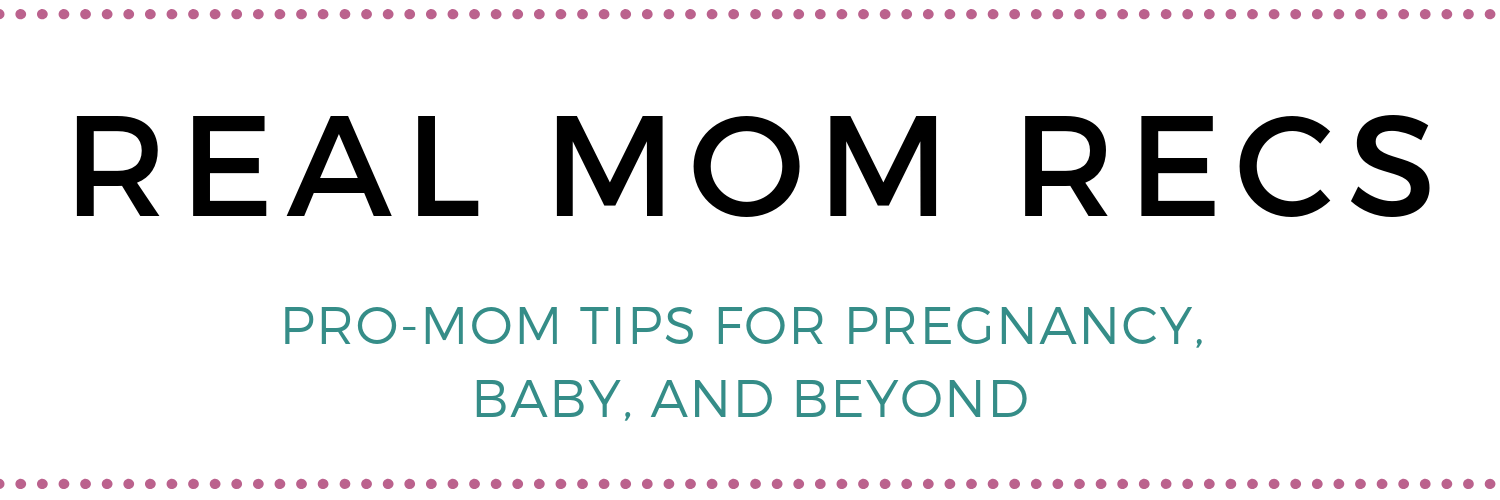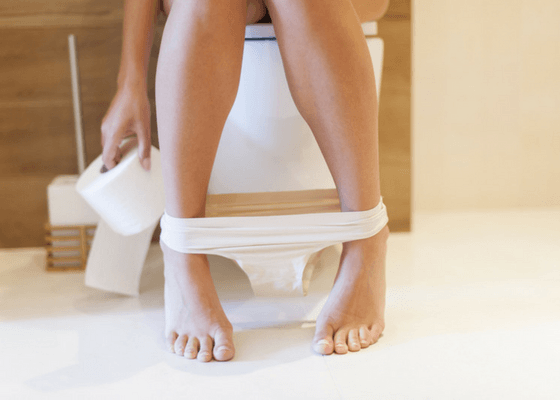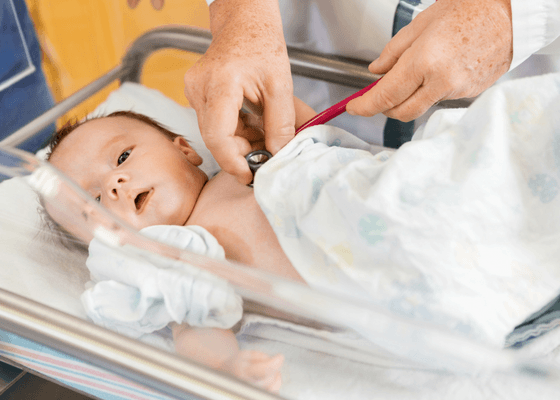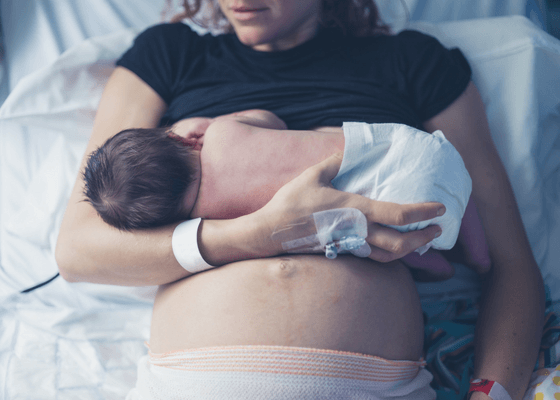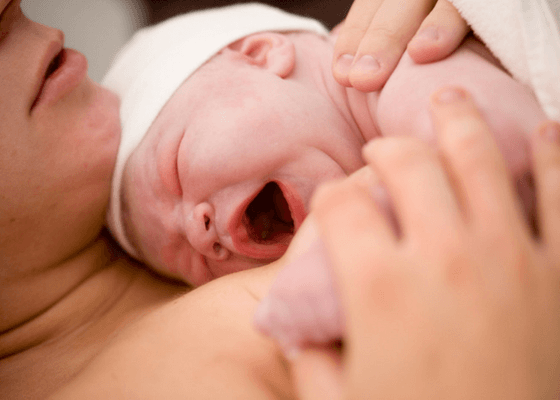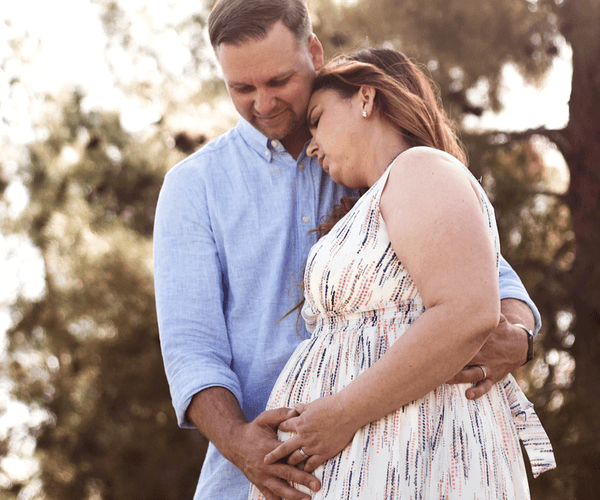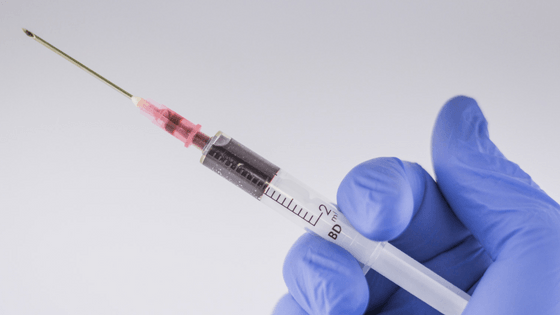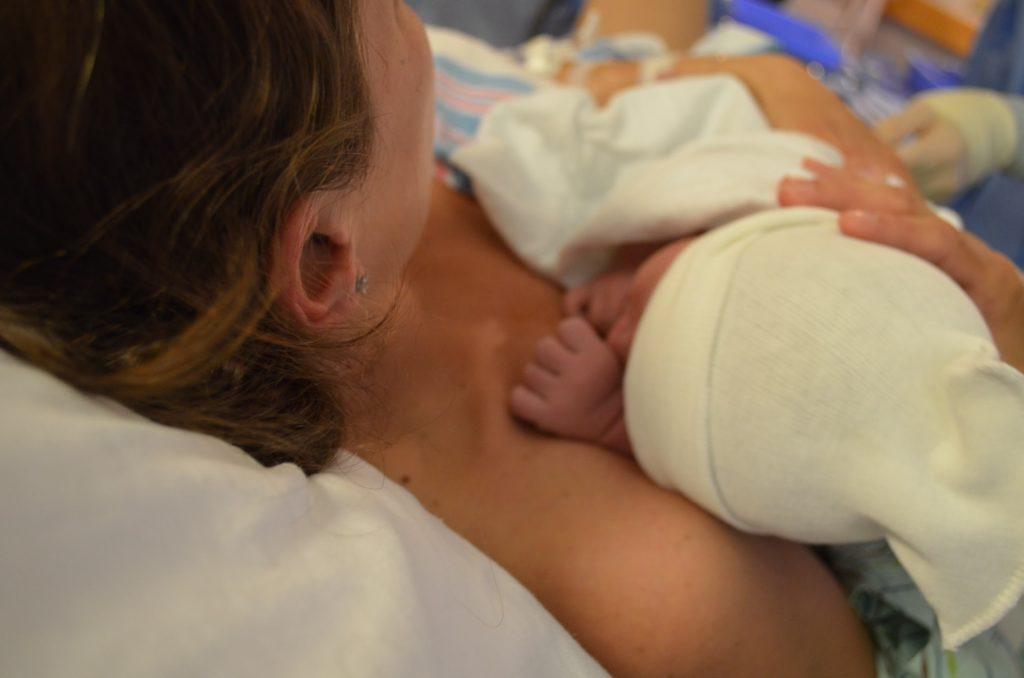When you’re pregnant for the first time, you will find yourself diving into research-mode about so many topics. Labor, childbirth, newborn baby care, breastfeeding, infant gear, safe sleep, and more. Somehow, it’s so easy to neglect to think about yourself and what actually happens to you after giving birth.
Most people (myself included) think of postpartum depression when they hear the word “postpartum”. But all postpartum actually means is after giving birth.
So many things go on with a new mom after delivery, both physically and emotionally. Here is a summary of the most notable experiences that stood out to me after birth that I wish I had been a little more prepared for.
(Note that my birth experiences were both vaginal births, so if you have a c-section some, but not all, of these may be different.)
Being forced to get up and walk
I had never heard of this requirement in my life, but a mere 90 minutes after giving birth for the first time, I was told I had to get up and walk to the bathroom. I have no idea what the medical reason is for this, but I can tell you it was downright terrifying.
First of all, I had an epidural that was not fully worn off yet and one of my legs was still numb.
I also had brand new stitches from “many” second degree tears down there. Not to mention the blood loss.
All of these factors combined made for quite the show out of my hobble to the bathroom which was probably only 3 yards from my bed.
Immediately upon getting up I felt extremely dizzy and was scared I was going to faint. The one nurse who was helping me realized she needed backup and called for another nurse to help support my other side. I almost asked for a chair to sit down on half way through, but it felt ridiculous given how close I was to the toilet already.
I have since heard of many postpartum nurse horror stories that are so much worse than this, that I don’t even want to complain too much about it. But at the time, I felt very humiliated and unsupported over this walk- no, shuffle- of shame. If I’d been given just an hour or two more to recuperate I’m sure it would have been a lot easier on me.
The pain of peeing
After pushing a baby out, you might have first, second, third, or even fourth degree tears (the one that goes all the way through- try not to wince, and don’t worry- these are rare). But even if you’re lucky enough to make it through without any tears severe enough to require stitches, you still had a great deal of stretching which is enough to cause many minor, fine tears in the tissue.
These will heal quickly on their own, but when you sit down to pee and the urine washes over them, it will burn like your entire womanhood has been lit on fire.
To avoid this, this handy dandy little squirt bottle will be your best friend. Just squeeze cold water on yourself while peeing and you will barely feel the urine on the cuts.
They give these out at most hospitals, but you may want to check and ask ahead of time and make sure they do at your hospital.
The scary first poop
Ok, I apologize that so many of these revolve around toilet issues. But this is the real deal and I’m trying to be honest more than polite.
Having to poop after giving birth is scary.
Maybe you are lucky and can avoid having to go in the first day or two after birth. Typically your body “clears out” before delivery, and you typically can’t eat during labor, so it’s possible.
But sooner or later, it’s going to happen.
Right in the midst of hobbling around feeling like your insides are falling out, while you’re rocking your padsicles trying not to feel anything down there- you have to push out a poop. I’ve been told this particular poop can feel like pushing out glass.
Luckily I had been warned ahead of time that when they offer you the stool softener, you say yes.
Without this warning, I’m sure I would have been perplexed as to why it was even being offered to me. “No thanks, I’m good, I’m not even constipated!” could have been my completely naive response.
Thanks to an older sister who had given birth before me, I said “yes please” and avoided a terrible post-delivery poop trauma.
Not gonna lie, it was still a little scary. But at least it didn’t feel like glass.
The most sore abs you’ve ever had
Think of pushing a baby out like the most intense ab workout you’ve ever done.
The pushing stage could go on for hours, especially if it’s your first. And chances are you haven’t done any ab exercises in many months.
Makes sense that you’re going to feel very sore after? You bet!
Want to be 100% prepared for labor, delivery and beyond? The Birth Smart Planner is a bundle of over 75 Printables with checklists for everything including packing your hospital bag, prepping your house, writing your birth plan, and more (oh how this would have helped my disorganized mommy brain when I was pregnant!) My favorite part is the Breastfeeding Handbook- it’s comprehensive, yet straight to the point for when you need quick answers during those first few weeks of figuring out breastfeeding.
Postpartum bleeding
My midwife had warned me ahead of time that it’s normal to bleed for up to six weeks after giving birth. I scoffed at that timeframe and thought “no way is it going to last that long.”
Well the karma gods must have heard me and laughed, because I ended up bleeding for TEN STRAIGHT WEEKS.
The first few days postpartum is when you experience the very heavy bleeding. You may have even heard about “golf-ball sized clots”.
This is the time when you need the big mama pads. Don’t send your husband out to go buy some cute little pads. Get the biggest, ugliest pads you can find. Pair them with the biggest, ugliest underwear you can find as well, because chances are they are going in the garbage after.
The next couple of weeks after that, the bleeding is similar to a normal period. You can use normal pads, and you’ll probably want to wear your comfy maternity underwear.
For an unknown number of weeks following that, the bleeding is much lighter. It changes from bright red blood to pink, then yellowish. It gradually tapers off to nothing just when you think you’ll never be able to live without pads again.
The fatigue
If you’re like me, you have something written in your birth plan about how “baby will room in with me” or “keep baby with me at all times.”
It’s a good goal to have, and certainly some new moms are able to pull it off.
Just consider the possibility of this:
- Your water breaks at 1am after only a couple hours of sleep
- The rest of that night is spent preparing and making your way to the hospital
- 20 more hours are spent in labor
- 2 hours are spent pushing
- You are handed your bundle of joy and you have now completely missed TWO NIGHTS OF SLEEP IN A ROW.
In any other circumstance in life, after pulling two consecutive all-nighters you would go home and fall into a 12 hour coma-like rest.
But now you have a newborn, so you are sleeping with one eye open for maybe 90 minutes at a time.
If you decide in that moment that you’d like the nurses to keep the baby for a couple hours so you can get something that almost resembles real sleep, forgive yourself. You are allowed to change your plan.
Believe me, it won’t be the last time that your motherhood ideals don’t mesh with the reality of parenthood.
Not being able to handle visitors
During pregnancy, you are so excited at the thought of your new little one being here, you can’t wait to show him off to all your friends and family. You might even tell people you want them to come meet the baby while you’re still in the hospital.
I would caution against this in most cases.
The reality of the hospital experience may be very different than what you imagined. Of course there is the hefty dose of exhaustion, and there is also a revolving door of doctors and nurses coming and going to check on you and the baby. Vitals need to be taken, tests need to be done, more blood needs to be drawn.
Added on top of that is the stress of trying to figure out breastfeeding. There will certainly be no such thing as a schedule for a baby who is only a couple days old at maximum, so you will need to nurse at unpredictable intervals, possibly every hour.
Trying to coordinate a time for people to come might just be overwhelming to you during all of this. Even more so if visitors drop in unannounced.
You honestly might just be dying for some alone time.
My advice would be to hold off on visitors outside of the immediate family until you get home and decide you’re ready. Or, decide in the moment how you’re feeling in the hospital and let the people you want to see know when you want to see them. I recommend giving them a short window of 20-30 minutes so they don’t overstay.
Remember, you can always invite more people or extend visits longer. It’s much harder to take back an invitation that you previously extended or try to cut a visit short while it’s in process.
The clothing dilemma
Everyone knows someone who knows someone who left the hospital maternity ward in their pre-pregnancy clothes. It’s like the baby name myths of Lemonjello or La-a.
For the rest of the world, you’re going to leave the hospital in maternity clothes. Possibly the same size you came in with, but probably your second trimester size clothes.
You’ll also be sore, so stretchy clothes are your friend.
When packing your hospital bag, it’s a wise idea to pack a couple options of clothes (especially if you’re going with pants) because it’s very hard to predict how much swelling you’ll have or how fast your belly will go back down.
Don’t dress for fashion, you’ll be sporting humungo pads and mesh underwear and you will just want to be able to walk comfortably.
A lose-fitting comfy dress might be a good choice too, especially in the event of a c-section when you won’t want anything rubbing near your scar.
The rollercoaster of emotions
Even if you’re not a crier, get ready for a ridiculous amount of tears after you give birth.
I promise you, there will be crying.
You’ll cry because you dropped your pen. You’ll cry at every single commercial on TV. You might feel like you’re going crazy crying over these ridiculous things.
It’s just the insane amounts of hormones that built up throughout the pregnancy rapidly exiting your body. Some call it the baby blues, and it’s completely normal.
What you want to watch out for (and alert your partner to help you be on the lookout) is the normal baby blues becoming postpartum depression.
Crying for silly reasons and then quickly laughing it off during the week or so after giving birth = baby blues
Feeling anxious about being alone with your baby, not wanting to leave the house, not wanting to see anyone, feeling like you’re a terrible mother, or thinking that you shouldn’t have this baby, are not baby blues. These are red flags for postpartum depression.
If you’re even questioning that you could have postpartum, call your healthcare provider and let them do a screening and decide. If you feel unable to make that phone call, ask your partner or someone you trust do it for you. Don’t suffer until your 6 week follow up if you think there may be a problem sooner.
The sweating
Another fun side effect of the hormonal changes is night sweats.
I gave birth in the dead of winter and New England and still woke up in the night completely drenched in sweat.
Yes, it’s gross, but luckily it only lasted a week or two and then it was back to dry PJs (well, dry except for the leaking breasts).
The pain of breastfeeding
I’ve written before in 7 Breastfeeding Surprises how I felt extreme pain and cramping in my uterus while breastfeeding shortly after giving birth.
In addition to that, many new moms experience painful breast engorgement and cracked nipples.
It’s safe to say you can expect breastfeeding to be uncomfortable at the start. The range could be anywhere from mildly uncomfortable to very painful.
Most of the time, these issues are resolved pretty quickly and breastfeeding should not continue to be painful beyond that initial stage. If it is, there is probably an underlying issue like a tongue tie or lip tie, and you should have a doctor look into it further.
Feeling like you don’t matter anymore
This is truly one of the hardest parts of the postpartum experience, and it’s rarely talked about.
When you’re pregnant (and especially at the end when you’re very noticeably pregnant) everywhere you go you get comments, accommodations, and just generally people trying to help you out. Everyone wants to give you a seat, hand you a glass of water, make sure you’re comfortable. Everyone asks how you’re feeling, how you’re sleeping, if you’re hungry.
As soon as that baby exits your body, all (or almost all) of that care and concern shifts to the baby.
Of course, in a way, that’s how it should be. The baby is a helpless new life and you’re an adult woman.
But that doesn’t mean that the change isn’t jarring, and that it doesn’t hurt.
If you’re lucky, you will have one or two close people in your life that still remember to ask how you’re doing and if they can help you with anything. Your partner, if he’s a good one, will still be looking out for your comfort and bringing you food and water.
Just don’t be surprised if all the other family members barely act like you’re there.
And if it makes you feel invisible, or sad, or like you don’t matter anymore, remember to talk to the people closest to you and remember that you are important. You are important now more than ever! The new baby craze will die down soon enough, and you will resume your normal, average place in society.
Most of all, remember that a good mother makes herself a priority. Seek out the support you need. Let others know how you’re feeling and get help when you need it.
The postpartum experience is paradoxically one of the most difficult and most beautiful times of your life! Remember to treat yourself gently. And when it gets hard, remember that it doesn’t last long.
